PuneConnect, which earlier was a purely startup focused event is now returning this year in an even bigger, expanded format. The event is now a technology and startup event with 4 different tracks—startups, technology, leadership, and academia. So, startups showcasing their products at this PuneTech will have a much more diverse audience to pitch to, and the potential to find prospective customers, mentors, employees, co-founders, and investors.
The startup track of PuneConnect is now in its 7th edition, and is one of Pune’s most important events for startups. Early stage startups get a chance to showcase their products and services to larger companies in Pune, senior and juniors from the technology industry, VCs and angel investors from all over the country, and others from the ecosystem. PuneConnect 2018 is on 20th October 2018, at Westin, Pune. It is a full-day event where selected startups will be provided with a table in the demo hall.
This event is free for startups selected by PuneConnect. If you are unsure of whether this event is appropriate for you or not, please go ahead and apply, and our selection committee will figure out whether you’re a good fit or not. Please apply right away. The last date to apply is 1st October 2018.
Any startup company that has a product that they would like to demo, should submit a proposal at http://db.puneconnect.com/pc/combo-form/. (The product must be ready/working on the date of the event.) A panel of selectors drawn from experts in the industry will select the most promising startups who will be allowed to set up a demo at PuneConnect, in Westin, Pune, on 20th October 2018.
There will be a special quota for students – i.e. startups whose founders are still students will be given special consideration, so if you know someone in this category, please forward this info to them.
Benefits to selected startups include:
- Exposure to Pune’s top companies (potential customers and potential mentors)
- Exposure to Pune’s software developer community (potential employees and potential co-founders)
- Exposure to Venture Capitalists and Angel Investors who are being invited to the event
- Press and media coverage before and after the event
PuneConnect started in 2011 and is usually held in late October/early November every year (except for a gap in 2017). For the last few years, we’ve been selecting about 25-30 startups for demos out of 150+ registrations that we receive. Click here for more information about past PuneConnect events.
Media Coverage: In past PuneConnects, Economic Times, Indian Express, The Financial Express, the Financial Chronicle, Business Standard, and the top Marathi newspapers Sakal and Maharashtra Times all have carried detailed articles about PuneConnect and the companies.
PuneConnect is a joint initiative of Software Exporters Association of Pune (SEAP), TiE Pune, PuneStartups.org (POCC), PuneTech, and NASSCOM, SME Joinup, CIIE Ahmedabad, and MCCIA Pune – basically all the important players in Pune’s startup ecosystem. PuneConnect represents a one-of-its-kind activity that bridges the gap between the new companies and the established ones.
Apply now. It costs nothing. Please apply right away. The last date to apply is 1st October. (Note: this is just a call for applications for the demo hall. A separate announcement will be sent out for registrations for attending the event as a delegate.)


